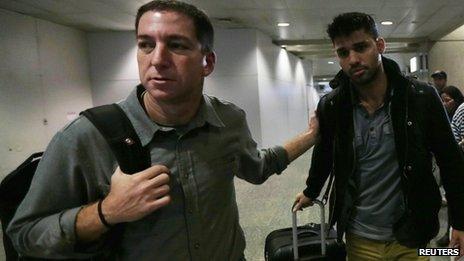Edward Snowden articles 'could be acts of terror'
- Published

Glenn Greenwald (left) was reunited with David Miranda when his partner returned to Brazil from London
The publication of material leaked by Edward Snowden is capable of being an act of terrorism, the home secretary's barrister has said.
The claim was made in legal papers in a High Court case in which the partner of Guardian journalist Glenn Greenwald is challenging his detention at Heathrow in August under anti-terror laws.
David Miranda was carrying data files for Mr Greenwald who has covered data leaked by US whistleblower Mr Snowden.
He says his detention was unlawful.
The two-day judicial review action is being contested by the home secretary and the Metropolitan Police.
Mr Miranda was en route from Berlin to Rio de Janeiro on 18 August when he was detained, questioned and searched by police at Heathrow under Schedule 7 of the Terrorism Act 2000.
Nine items, including his mobile phone, laptop, memory cards and DVDs were taken from him.
'Journalistic work'
Lawyers for the 28-year-old Brazilian say the case is "exceptional" because it "involves the use of Schedule 7 powers to obtain highly controversial journalistic material" which, they say, "appears to be unprecedented".
They say the use of the powers was "unlawful and disproportionate".
An earlier court hearing was told that Mr Miranda was carrying tens of thousands of highly-classified documents, including information that identified intelligence staff and could have put them at risk.
But his lawyers argue that Mr Miranda - who was released without charge - was simply "assisting Mr Greenwald's journalistic work".
Mr Greenwald - who has since left the Guardian - wrote a series of articles for the paper about surveillance by intelligence agencies in the UK and the US.
They were based on information leaked by former US intelligence analyst Mr Snowden.
In written submissions before the judges, Steven Kovats QC, representing Home Secretary Theresa May, said the "disclosure of all the material stolen by Mr Snowden would be gravely damaging to the national security of the United Kingdom".
He said such disclosure would "endanger lives" and added that the home secretary "pursuant to her duty to protect national security, had a duty to act against that risk".
Mr Kovats said Mrs May's national security duty to find out the nature of Mr Miranda's activity was "consistent" with the police's use of Schedule 7.
The home secretary submitted that publishing material obtained by Mr Snowden was capable of being an act of terrorism, the QC added.
'Global interest'
Therefore "seeking to establish the nature of the claimant's activity" met her national security duty and discharged the police's Schedule 7 function to seek to determine "whether the claimant was or appeared to be a person who was or had been concerned in the commission, preparation or instigation of acts of terrorism".
Matthew Ryder QC, for Mr Miranda told the court: "This claim is about the use of counter-terrorism powers, that can only be used at ports and airports, to seize journalistic material."
He said the case "illustrates vividly" why the use of Schedule 7 powers were not compatible with the right to freedom of expression - Article 10 of the Human Rights Act.
Mr Ryder said Mr Greenwald's articles about surveillance, based on source material provided by Mr Snowden, had "resulted in global public interest at the highest level".
'Disproportionate interference'
The QC said the powers used in Mr Miranda's case "were exercised for an improper purpose".
The "dominant purpose" of the police officers was not to determine whether he was involved in the commission, instigation or preparation of acts of terrorism but to "assist the security service in accessing material in the claimant's possession", Mr Ryder added.
He said exercising the powers had been unlawful because it was "a disproportionate interference with his right to freedom of expression".
Mr Ryder said neither the police nor the security service, MI5, had tried to use the courts process to retrieve the data nor had they launched any investigation to do so before Mr Miranda was detained.
High Court judges have ruled previously that material taken from Mr Miranda could be examined only for the purposes of national security and the protection of the public.
- Published30 October 2013
- Published16 October 2013
- Published11 October 2013
- Published19 February 2014